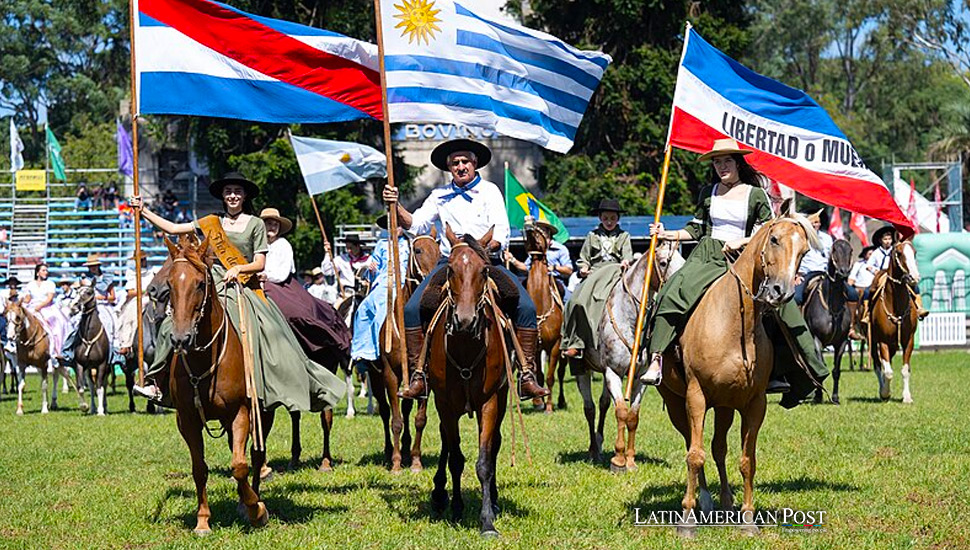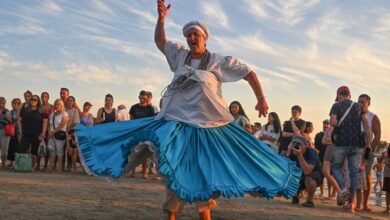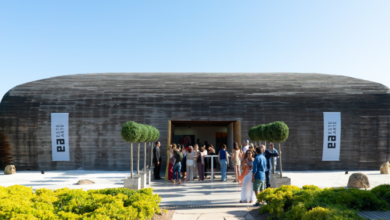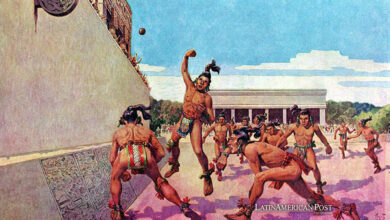Uruguay’s Jineteadas Adapt to Modern Times

Uruguay’s Semana Criolla evolves, blending traditional gaucho heritage with modern safety and animal welfare practices. This reflects a broader Latin American trend of preserving cultural identity while embracing contemporary norms.
In the heart of Montevideo, the Prado’s dust rises with the gallop of horses during Semana Criolla, Uruguay’s homage to its gaucho roots. This event, steeped in history, traditionally showcases the daring skill of jinetes (riders) taming wild horses, a spectacle enjoyed amid the aromatic scents of mate and asado. Yet, as time passes, this festival transforms, merging time-honored practices with modern safety measures and a newfound focus on animal welfare.
Semana Criolla, coinciding with the global observance of Holy Week, culminates on Easter Sunday. In Uruguay, it is also known as Semana de Turismo, highlighting its significance as a cultural and tourist cornerstone. The main attraction, a rodeo-like event, symbolizes the country’s deep-rooted gaucho culture.
Cultural Magnetism and Evolution
As the 97th edition unfolds, record-breaking attendance underscores its cultural magnetism. María Inés Obaldía, Montevideo’s Director of Culture, compares the crowd’s enthusiasm to a packed stadium, indicating a strong, continued interest in this cultural festivity. The event entertains and serves as a marketplace, showcasing local and regional craftsmanship, offering everything from leather goods to artisanal wares.
Recent years have brought changes, notably after incidents raised concerns about animal treatment. The 2023 edition faced scrutiny when the death of a horse sparked protests, urging a reevaluation of the traditional jineteadas (horse-taming events). Responding to these concerns, the local government introduced measures to enhance safety and animal care, including the possibility of random blood tests for the competing equines and the presence of a permanent veterinary team.
In 2024, introducing optional protective vests for riders marked a significant change aimed at enhancing safety. The number of taming events was reduced, leading to fewer competition days. Plans to include helmets for riders in the following year reflect a cautious yet definite shift towards aligning with international standards despite cultural resistance.
An animal welfare day is a notable addition to the event, featuring demonstrations and workshops that promote a more empathetic approach to horse interaction. This initiative, led by the equestrian center Un paso adelante, aims to introduce the community to alternative, more humane ways of relating to these animals.
This evolution in Uruguay’s Semana Criolla indicates a broader trend in Latin America, where countries grapple with balancing traditional practices with modern ethical standards. Like Uruguay, nations like Argentina and Brazil are navigating changes in their gaucho traditions, integrating modern safety protocols and animal welfare considerations into their cultural events.
The transformation of Semana Criolla mirrors the continent’s journey towards modernizing tradition while retaining its cultural essence. Across Latin America, there is a growing recognition of the need to update historical practices to align with contemporary values of safety and compassion without forsaking cultural heritage.
In the broader Latin American context, this shift is part of a larger narrative of cultural evolution. Countries increasingly scrutinize traditional events and practices, ensuring they reflect modern ethical standards. This movement towards modernization, however, is challenging. Balancing tradition with innovation requires delicate navigation to maintain the cultural significance of these events while ensuring they adhere to contemporary societal norms.
With its mix of historical reverence and modern sensibilities, Uruguay’s Semana Criolla serves as a microcosm of this regional transformation. It exemplifies how Latin American societies are redefining their cultural legacies to resonate with today’s global values of safety, ethical treatment of animals, and inclusivity.
As the region evolves, these cultural festivities will likely undergo further modifications, reflecting the dynamic interplay between tradition and modernity. The changes within Semana Criolla highlight a conscious effort to preserve the cultural narrative while responding to the ethical imperatives of the present day.
Also read: Venezuela’s Fencing Thrust: An Olympic Dream Takes Shape
The adaptation of Uruguay’s Semana Criolla is a testament to the broader Latin American endeavor to honor and sustain cultural traditions while embracing the necessary changes brought by modern times. This evolution reflects a collective journey towards a future where cultural heritage and contemporary values coexist harmoniously, ensuring the legacy of the past enriches the present and future generations.





